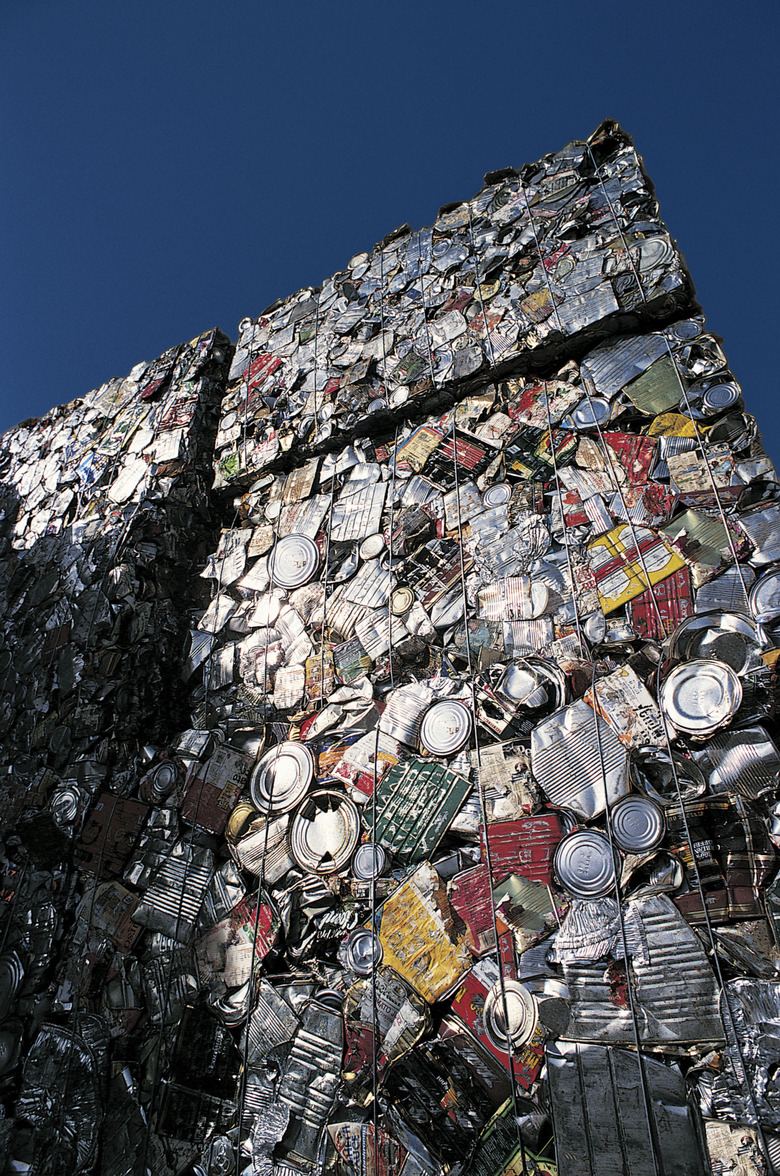Aluminum Can Recycling Pros & Cons
Each year the United States uses roughly 1.9 million tons of aluminum for containers and packaging, such as aluminum cans. Recycling these lightweight, durable containers has many benefits in terms of energy use, cost and environmental impact. The pros to recycling aluminum cans are many and the cons are relatively few.
Energy
Energy
Aluminum is produced by refining a mineral called bauxite which contains a chemical called alumina with the formula Al2O3. Refineries separate the aluminum from the oxygen by combining it with another mineral called cryolite, melting it at a temperature of 950 degrees Celsius (1742 degrees Fahrenheit) and forcing an electric current through the molten aluminum with graphite electrodes. This process consumes an enormous amount of electricity. An aluminum can, by contrast, is already made of refined aluminum, so it's relatively easy to melt it and process it for making another can. Recycling aluminum requires just 5 percent of the electric energy required to make a virgin product.
Environmental Impact
Environmental Impact
Producing electricity for aluminum refining often entails burning fossil fuels, which releases carbon dioxide, a greenhouse gas. Transporting the bauxite ore from the mine to the refinery also requires a large amount of energy. All in all, it takes the equivalent of about 1,740 gallons of gasoline to produce one ton of raw aluminum — releasing a large amount of greenhouse gas into the atmosphere. Recycling a ton of aluminum cans, by contrast, only uses about 90 gallons of gasoline or the equivalent in fossil fuels. So recycling aluminum cans has a significant net positive environmental impact. Best of all, aluminum can be recycled indefinitely, meaning you can recycle a can and make it into another one for an unlimited number of times.
Economics
Economics
Aluminum cans are among the easiest consumer goods to recycle, because recycled aluminum is cheaper than brand new product, making manufacturers eager to buy recycled. That's why aluminum is more frequently recycled than any other consumer product in the US. The money spent by the aluminum industry on buying recycled product benefits local recycling centers and programs and the cities that run them. Some charities also conduct can collection drives as a way to earn money to support their projects.
Cons
Cons
There aren't many cons to aluminum-can recycling. Using reusable containers is better than buying products packaged in aluminum cans, since that way you save the energy required to refine the aluminum in the first place. But if you're going to use aluminum cans, recycling them will benefit the environment and provide economic benefit.
References
- EPA: Wastes, Resource Conservation, Aluminum
- Chemical Principles, the Quest for Insight, Fourth Edition, pages 598-599: Peter Atkins and Loretta Jones
Cite This Article
MLA
Brennan, John. "Aluminum Can Recycling Pros & Cons" sciencing.com, https://www.sciencing.com/aluminum-can-recycling-pros-cons-8415/. 24 April 2017.
APA
Brennan, John. (2017, April 24). Aluminum Can Recycling Pros & Cons. sciencing.com. Retrieved from https://www.sciencing.com/aluminum-can-recycling-pros-cons-8415/
Chicago
Brennan, John. Aluminum Can Recycling Pros & Cons last modified August 30, 2022. https://www.sciencing.com/aluminum-can-recycling-pros-cons-8415/
